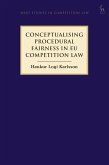What drives popular support for state-enforced competition policy? What is it about antitrust law that garners approval from both the public and courts, to the point of demonizing large firms convicted of antitrust offenses? In this book Adi Ayal argues that the populist roots of antitrust are still with us, guiding sentiment towards a legal regime that has otherwise shifted towards economic analysis. Antitrust is very much about fairness and morality; this book assesses how modern policy has hijacked popular support - based on traditional conceptions of political and economic power - to combat market power in narrowly defined micro-markets.
Beginning with history, but delving into moral and political philosophy, Professor Ayal shows how arguments concerning fairness in antitrust apply both to monopolists and their victims. Fairness thus requires a balancing test based on context and respecting the rights of all parties involved. While traditionally fairness arguments were used to justify intervention where economic analysis did not, this book assesses them from first principles, to show that pure efficiency analysis is flawed from a moral standpoint when the state intervenes. Protecting weak consumers from strong monopolists may carry rhetorical weight, but the reality of antitrust is that the state is much more powerful than almost all firms it regulates. Protecting the strong from the weak, especially when 'weak' consumers hold legal power and influence, might very well be a moral imperative. This book offers a philosophical account of the conundrum facing competition policy which challenges widely-held yet often implicit and unfounded beliefs.
Beginning with history, but delving into moral and political philosophy, Professor Ayal shows how arguments concerning fairness in antitrust apply both to monopolists and their victims. Fairness thus requires a balancing test based on context and respecting the rights of all parties involved. While traditionally fairness arguments were used to justify intervention where economic analysis did not, this book assesses them from first principles, to show that pure efficiency analysis is flawed from a moral standpoint when the state intervenes. Protecting weak consumers from strong monopolists may carry rhetorical weight, but the reality of antitrust is that the state is much more powerful than almost all firms it regulates. Protecting the strong from the weak, especially when 'weak' consumers hold legal power and influence, might very well be a moral imperative. This book offers a philosophical account of the conundrum facing competition policy which challenges widely-held yet often implicit and unfounded beliefs.









